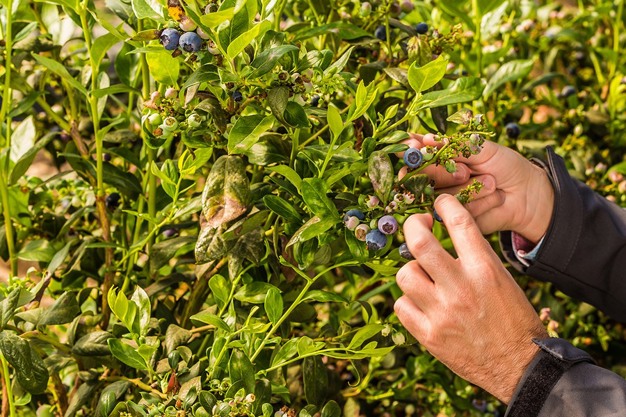Huelva's first extra-early blueberries of the 2024/2025 season are already hitting the markets. The supply of this exclusive variety is still limited and is making headway against the dominant supply from the southern hemisphere. At the same time, the first batches of potted strawberries are also arriving to a relatively empty European market, although Egyptian, Greek and Moroccan shipments will gradually increase. Meanwhile, raspberries have seen an increase in the supply in the fall.

"We have been harvesting and selling the earliest blueberries from Huelva, our exclusive Demba variety, for around three weeks now," says Carlos Esteve, sales director of the second-grade cooperative Onuba Fruit, "We are probably the only ones in Huelva producing blueberries at the moment, as Europe is currently mainly supplied with fruit from the southern hemisphere, mainly Peru and South Africa," he says.
The Demba is part of a program of five varieties developed to extend the campaign and be able to start supplying on dates when blueberries had so far never been produced in Huelva. "We are also replacing some obsolete mid-season varieties with new varieties that are better tasting, more productive and less costly for our growers, and also bringing in late varieties to extend the season," says Carles Esteve.
"The supply of extra-early blueberries is currently limited and, for the time being, we are targeting the domestic market, where they are being very well received by those willing to pay a bit more for a fresher product with a lower carbon footprint compared to overseas blueberries," says the Sales Director of Onubafruit.
Over the next few weeks, volumes will increase and they will also be shipping to other European countries. At the end of this month, the first blueberries from Chile and Morocco will also start to arrive in Europe.
Spanish strawberry production benefiting from excellent weather conditions
A couple of weeks ago, the first potted strawberries started to be harvested in Huelva. "We are talking about very small volumes at high prices. In a week's time, the bare-root strawberries will start to be harvested. These have had optimum conditions during the growth stage thanks to the good level of humidity in the soil due to the autumn rains and the ideal temperatures. Unlike other years, there has been a lot less replanting," says Carlos Esteve.
According to the cooperative's Sales Manager, European markets are quite short of strawberries at the moment. "It is normal for the strawberry supply in Europe to be scarce at this time of year, but on top of that, this time there have also been some slight delays in the arrivals from Egypt, Morocco and Greece. Until a few days ago, it was very difficult to find strawberries on the shelves; in fact, our production season in Castile-Leon will be extended until December, something that had never happened before."
Onubafruit has expanded the acreage devoted to strawberries by between 7 and 8% and it continues to diversify with new varieties.
Raspberry production increases in the fall and a smaller supply is expected in winter
As far as raspberries are concerned, the production since October has been much greater than last year's. "We have marketed twice as many kilos as we had by this time last season. This change in the production curve points to there being a lower supply this winter until the beginning of spring. Producers are choosing to avoid growing in winter because it is more costly to produce and involves greater risks," says Carlos Esteve.
For more information:
Onubafruit S.Coop.And.
Tel.: +34 959 540 844
[email protected]
www.onubafruit.com
